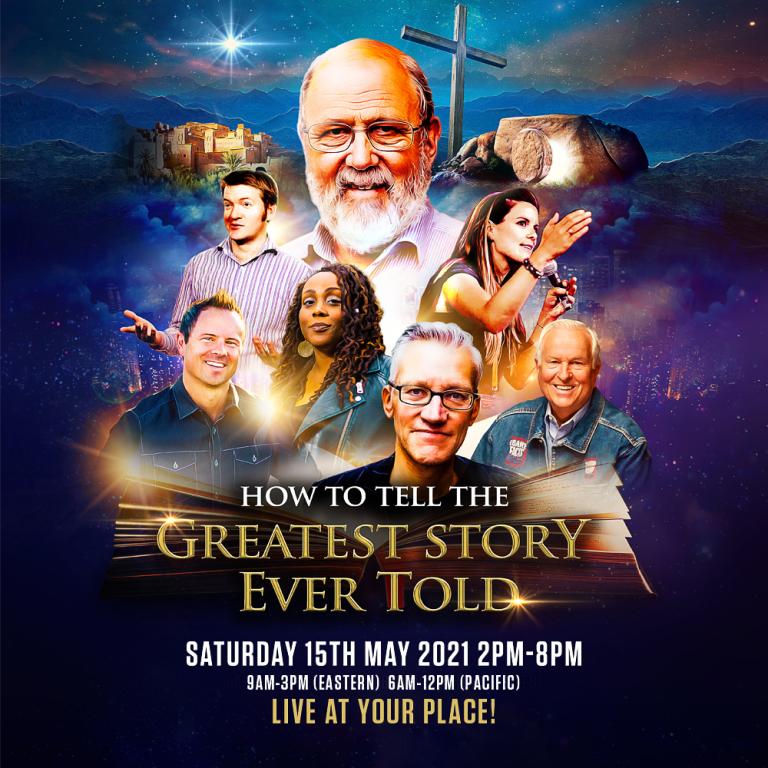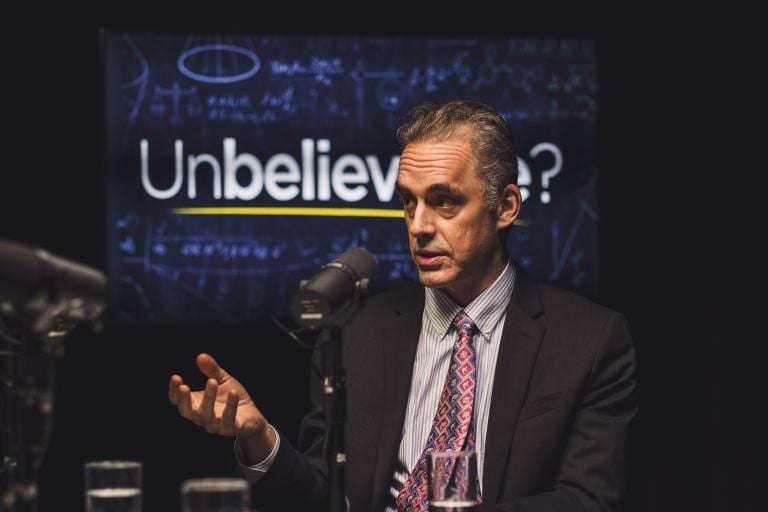
Unbelievable? the conference is coming up on May 15th and the theme is ‘How to tell the greatest story ever told’. The conference will bring together a distinguished group of theologians, historians and apologists to help us better understand the revolutionary nature of the story of an incarnate, crucified and resurrected God, and why the world so desperately needs to hear it. However, before we educate people on how to be better storytellers we must first ask ourselves if ‘story’ is the most suitable vehicle for gospel proclamation.
Why frame the gospel as the ‘greatest story ever told’? Surely, that feeds right into the hands of our critics who believe that Christianity is just one of many mythical god stories. Just another fanciful fairy tale that pales in comparison to the data obtained from a double-blind, placebo-controlled experiment.
I would counter that while data may make for a suitable scientific publication, it makes for a very poor description of life. Contrary to what materialists would have us believe, we aren’t rats in a cage but actors on a stage.
Eulogy or Audit?
Isn’t it interesting that eulogies don’t contain facts and figures about the deceased but are full of stories? We miss our loved ones not because of the ledger sheet they left behind but because of the drama we shared.
The problem with the enormous amounts of life data we accumulate is that it’s meaningless when we die. When we attend a funeral, we don’t care about the physical data of the deceased but rather how they transcended it. A eulogy would be quite sad if all we heard was:
“Here lies Bill, born 6/10/1954, birth weight 7lb 6oz, Apgar score 6 and 9, AGA (appropriate for gestational age). Educated through a master’s degree in economics. Worked fifty years, spawned three children who spawned three grandchildren, and died of cardiac failure 12/5/2008, amen.”
We want to know about Bill’s passions and hobbies and how he had touched the lives of others. We hope to hear a story full of poetic nuance, plot twists and conflict resolution, because a funeral where a stock portfolio is the only evidence offered for the significance of a human life is a sad thing indeed. If we are just animals that forage, fornicate and die, why do we eulogize each other with stories rather than just audit life data?

Story Time
We are pattern-seeking animals, and the pattern we’re most fond of seeking is that of a story. I remember when the announcement was made that there would be a twenty-four-hour news channel, CNN. I thought, is there really enough news to entertain us for twenty-four hours a day? In reality, I was right; there aren’t enough news facts to warrant twenty-four hours of coverage, but what I failed to perceive was that there aren’t enough hours in a day for talking heads to put those facts into a larger, more meaningful narrative.
Perhaps CNN should be called CMN, the Cable Metanarrative Network, because it seems to be obsessed with trying to understand the big picture. And whether you call it a metanarrative, overarching story or worldview, we all seem infatuated with taking individual experience and understanding its place in the larger global drama.
“Telling and listening to a story is the primary verbal way of accounting for life the way we live it in actual day-to-day reality. There are no (or few) abstractions in a story. A story is immediate, concrete, plotted, relational, personal. And so, when we lose touch with our lives, with our souls—our moral, spiritual, embodying God-personal lives—story is the best way of getting us back in touch again. And that is why God’s word is given for the most part in the form of story, this vast, overarching, all-encompassing story, this meta-story. (Eugene Peterson Eat This Book)
Literary Laboratory
I would assure my scientific friends that a story isn’t a figment of our imaginations but the literary equivalent of a clinical trial because it takes ideas and translates them into different genres, places them in different cultures and transports them to different times to determine if they are in fact universally significant.
Stories use the immanence of language to prove transcendent truths. Therefore, the question for us is not whether stories reveal truth, but rather which story is true? I would argue that the gospel is the only narrative capable of standing up to the rigors of the literary laboratory and emerging as the greatest story ever told.

Whose Story?
Our problem, however, is that instead of finding our place in God’s story we often write our own slobbering hagiographies. We get so caught up with the idea that we are self-made men and women that we forget that we are really characters individually imagined by the one true Author.
Sadly, even God’s Chosen People frequently went off script and foolishly improvised to suggestions thrown out by their pagan neighbors. Throughout the pages of the Old Testament, God repeatedly called His people to remember His story while warning them of the dangers of trying to write their own narratives.
God repeatedly referred to himself as the God of Abraham, Isaac and Jacob because He wanted to remind them of some of his most compelling characters. He called them to remember how He had dramatically freed them from slavery so that they wouldn’t forget the plot trajectory. God knew that they would become destitute if they went off script and pursued a life of improvisation.
Despite God’s warnings, they continued to cling to a majestic militaristic ending to their story, a story revision that died on a Roman cross. In a brilliant plot twist, the Author emptied himself and became a performer in His own salvation drama. He became ink on a page so that none of His beloved characters would be written out of the Book of Life.
“Just as character can only be truly rendered in narrative form, so the answer to the question ‘Who am I?’ can only be given if we ask, ‘What is my story?’ and that can only be answered if there is an answer to the further question, ‘What is the whole story of which my story is a part?’ To indwell the Bible is to live with an answer to those questions, to know who I am and who is the One to whom I am finally accountable.” (Leslie Newbigin, The Gospel in a Pluralist Society)
Myth Meets Man
Jordan Peterson is well known for his biblical lecture series where he used stories from scripture to explain archetypal patterns of human thought and behavior. After a significant health scare, he is back exploring many of these same issues in his excellent weekly podcast.
Recently, he had a conversation with his friend Jonathan Pageau where they discussed many of the precepts of Christianity. The episode garnered significant internet interest because of the vulnerability Jordan displayed when he talked about Jesus. The aspect of the Jesus story that made him tear up was the possibility that Christ was the meeting place of myth and man. All the accumulated stories of a supernatural realm that had been told over the centuries met the physical world in the person of Jesus.
“The difference between those mythological gods and Christ was that there’s a historical representation of his existence as well…What you have in the figure of Christ is an actual person who actually lived plus a myth, and in some sense, Christ is the union of those two things… I’ve seen sometimes the objective world and the narrative world touch…That seems to me oddly plausible, but I still don’t know what to make of it partly because it’s too terrifying a reality to fully believe. I don’t even know what would happen to you if you fully believed it.” (Jordan Peterson)
Peterson recognized that it is one thing to toy with archetypes in an academic Narnia but quite another when He walks through the wardrobe. Sadly, I think Peterson’s tearful response reveals a healthier respect for the significance of Jesus than that experienced by most Christians.
It is one thing to read myths but quite another to have them incarnate. It is one thing to contemplate supernatural stories but quite another for them to come in the flesh. Peterson got emotional because he recognized that if Jesus was who He said He was then the objective world and the narrative world have touched and it is a terrifying thing when worlds collide and archetypes meet their maker.

The World Will Never Be the Same Again
Historian Tom Holland and theologian NT Wright, both speakers at the upcoming Unbelievable? conference on 15th May, have written books that describe the significance of what happened when heaven touched earth.
Holland’s book, Dominion, chronicles the profound influence Christianity has had on history, while Wright’s book, The Day the Revolution Began, reflects on the massive rent torn in the fabric of time and space occasioned by the life, death and resurrection of Jesus. When heaven touched earth, all the stories from the past, present and future were swallowed up in an uber narrative, the greatest story ever told and the world hasn’t been the same since.
“The larger reality is that something has happened within the actual world of space, time, and matter, as a result of which everything is different. By six o’clock on the Friday evening Jesus died, something had changed, and changed radically. Heaven and earth were brought together, creating the cosmic ‘new temple’: ‘God was reconciling the world to himself in the Messiah.’” (NT Wright)
Story to End all Stories
In that same Jordan Peterson podcast, Pageau made the case that the gospel is the greatest story ever told because it reaches the limit of storytelling. It is the story beyond which no better story can be imagined:
“Christ died, went into Hades and then destroyed death and he pulls everybody out of death and then that’s it. What other story are you going to tell after that story? You have a story of someone who dies, goes into death and then destroys death and then that’s it. That’s the thing with the Christ story, every aspect of that story reaches the limit of storytelling and it’s impossible to go beyond it.” (Jonathan Pageau)
It is a story that lives on to this day, not as a retelling of an old Jesus legend, but as the real-time embodiment of a resurrected Christ. While Thomas is often critiqued for his doubt, he also displayed some profound wisdom, because he knew that only a resurrected Jesus with scars and a story to tell could make sense of his own.

Chapter Seeks Book
I think that a great deal of the emptiness we experience is due to the fact that we all feel our stories are incomplete and disappointed that our frequent attempts at improvisation have done little to fill that void. Deep down, we know we aren’t free-standing narratives but part of some great literature, and we want to know the Author.
The seemingly unquenchable thirst we humans have for purpose, meaning and spiritual satisfaction is a desire to understand our place in God’s story because our lives are like chapters searching for the ultimate book.
“Your eyes saw my unformed substance; in your book were written, every one of them, the days that were formed for me, when as yet there were none of them.” (Psalm 139:16)
A Story Too Good Not to Tell
The Bible is not just a Christian employees’ manual that punches our tickets to heaven; it is an invitation to participate in God’s story. It’s a bold and edgy page-turner where every chapter challenges us to work out our salvation with fear and trembling. The Author has commissioned us to tell this story because it is a story that is too good not to share. What could be more profound than telling the world about the moment when heaven touched earth, myth met matter, legend became history and God united with man?
It’s the greatest story ever told because it began “once upon a time” when “God said”, and it will end “happily ever after” when “He will wipe away every tear from their eyes, and death shall be no more, neither shall there be mourning, nor crying, nor pain anymore”.

The crucial moment when CS Lewis went from theism to Christianity was when his friend JRR Tolkien convinced him that his cherished pagan myths all shared a universal human longing which was finally satisfied in the historical birth, death and resurrection of Jesus Christ. By telling the greatest story ever told we incarnate the mythological longings of our friends and neighbors. It’s a powerful thing when “myth becomes fact” because when it does our “joy will be complete”.
“That which was from the beginning, which we have heard, which we have seen with our eyes, which we looked upon and have touched with our hands, concerning the word of life — the life was made manifest, and we have seen it, and testify to it and proclaim to you the eternal life, which was with the Father and was made manifest to us — that which we have seen and heard we proclaim also to you, so that you too may have fellowship with us; and indeed our fellowship is with the Father and with his Son Jesus Christ. And we are writing these things so that our joy may be complete.” (1 John 1:1-4)
I encourage you to sign up for the upcoming Unbelievable? conference on Saturday, May 15th, to hear some of the brightest Christian minds help us tell the greatest story ever told to a world that is desperately in need of some Good News.
Subscribe to the Unbelievable? podcast
Join NT Wright, Tom Holland, Josh McDowell and others online at the Unbelievable? conference on 15th May












